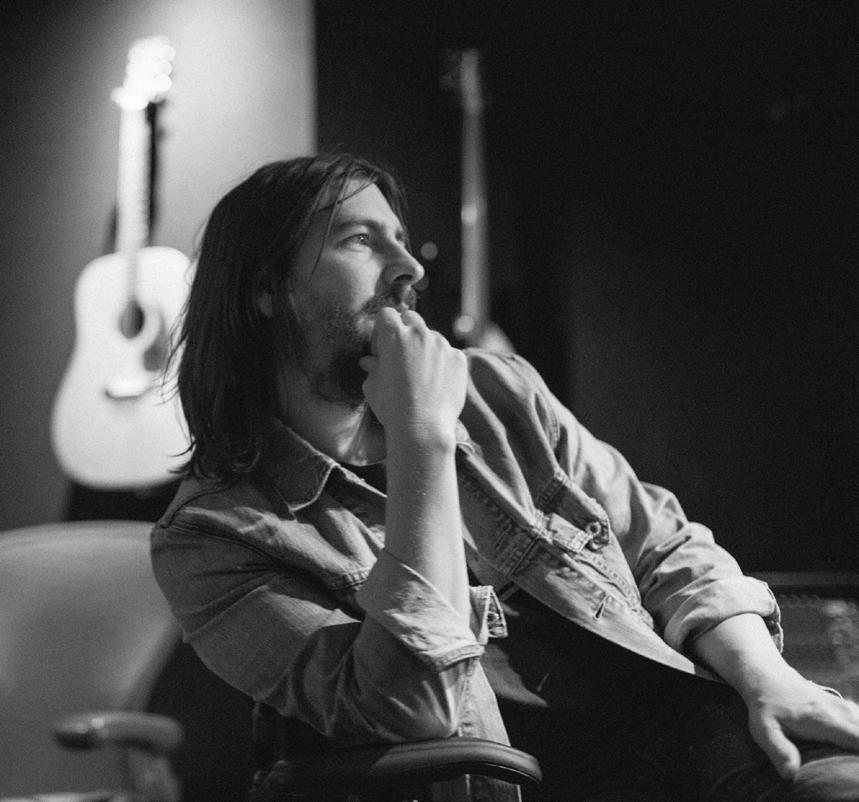
14 minute read
COVER STORY: DAVE COBB
DAVE COBB BY WARREN DENNEY

Dreams of life are often built on sound. The sound of emotion in a voice. The resonating chord cast by a lonesome guitar. Some cultures believe the origins of the universe began with a single sound cast as a vibration throughout the great void, pushing back the darkness.
ashville is fortunate to have Dave Cobb, the celebrated producer who prefers to stand behind the music, letting the sound and veracity of the song lead the way. Simplicity leads the way. “When I go in, I just, I like to capture things really quickly,” Cobb said recently, from his Nashville home this summer. “I’m not into when it starts to become ‘let's look for the perfect ambient noise in the background. Let’s spend two days on that. And let’s put the singer off from singing until we get that.
“It’s more like the singer’s right here, and I want to capture that vocal. I want to make sure we get that. Don’t miss that. I think that leads to simplicity. And a lot of times when you have the right vocal performance, what else do you need? I mean, honestly—does somebody go ‘I only liked that song because of that abstract piano note.’ I think it’s more about if I got that, I’m trying not to cover it up.”
For the record, Cobb is a six-time Grammy winner for his work. He is known to move from country, to Americana, to rock with ease — witness those Grammys for Chris Stapleton’s bombshell Traveller and Jason Isbell’s Something More Than Free, Country Album of the Year and Americana Album of the Year, respectively, in 2015; the double play again with Stapleton’s Country Album of the Year From A Room: Vol. 1 in 2017, and Isbell and the 400 Unit’s The Nashville Sound in 2018; and the two earned last year with Brandi Carlisle, one for co-writing and producing the Best American Roots Song “The Joke,” and as producer of her Best Americana Album By the Way, I Forgive You.
He was the Country Music Association’s Producer of the Year for his work on Stapleton’s From A Room: Vol. 1, has been named the Americana Music Association’s Producer of the Year twice, and earned AMA Album of the Year awards for Isbell’s Southeastern in 2014 and Something More Than Free.
But perhaps most importantly, Cobb produced John Prine’s powerful storybook Tree of Forgiveness, nominated for a Grammy itself in 2018 — an album that punctuated the indelible career of the workingman’s poet. And, Cobb is the last man to record Prine, who the world lost to the coronavirus in April this year. His poignant last recording “I Remember Everything,” was captured by Cobb, and engineer Gena Johnson, last fall at Prine’s home. It was a sign of trust. The song, released after his death, became Prine’s first No. 1 — shockingly — on a Billboard chart.
By respecting the song, and its heart, Cobb fundamentally respects the singers and musicians he has produced.
“[That song] felt like a classic, absolute peak-period Prine song,” Cobb said. “And, that’s just amazing. It’s just — I know how he put so much time into his songwriting, and how he worked hard at it — but when you hear that song, it feels so effortless. And, he was excited about making a new album and that was one of the songs that was going to be on it. He was in talks about doing a documentary. And, so he wanted to get it [the song] done. He had been on tour and had to come back because he had some health issues. He wanted to get it documented — we would have put it down in the studio this summer. We just decided to go to his house instead of him coming to us — it’s not that hard to show up with a couple of microphones. And I felt like he was comfortable.”
Prine chose late night, fittingly.
“We went there around 10:30, I think,” Cobb said. Gena set it up, and we went over there and he ran it a few times, and we laughed and it just felt like we were doing a song. Just to document it. It didn’t feel by any means like his last song, because that guy was full of life. He was just — I’ve never met somebody that lives life the perfect way like John Prine does.
“I mean that guy, every day he wakes up, and he smiled. And, then he had his whole life planned around food. It’s like, he went to Arnold’s for meatloaf, and this place for this, and that. He just had it all figured out. He woke up every day with a smile. And, so I certainly didn’t think that song was going to be his last song. We’re supposed to be making a record right now in July. We had time held, and it breaks my heart thinking about it.”
It’s hard to underestimate just what Prine means to Nashville. An insightful, ephemeral songwriter, he’s been hailed by everyone from Dylan to Haggard (Dylan has referred to him as “pure Proustian existentialism. Midwestern mind trips to the ‘nth’ degree.”) That he chose to stake ground in a town known for its songwriting machinery is testament to his own belief in the simple power of the song. On the surface, it might have seemed a poor match, but Prine was country from the get.
While recording Tree of Forgiveness, Cobb, who didn’t know Prine very well, talked to him about his approach. He likened it somewhat to Sam Phillips. He came at producing with an open mind, and didn’t always want to know the song on the slate, or what was coming up. continued on page 18
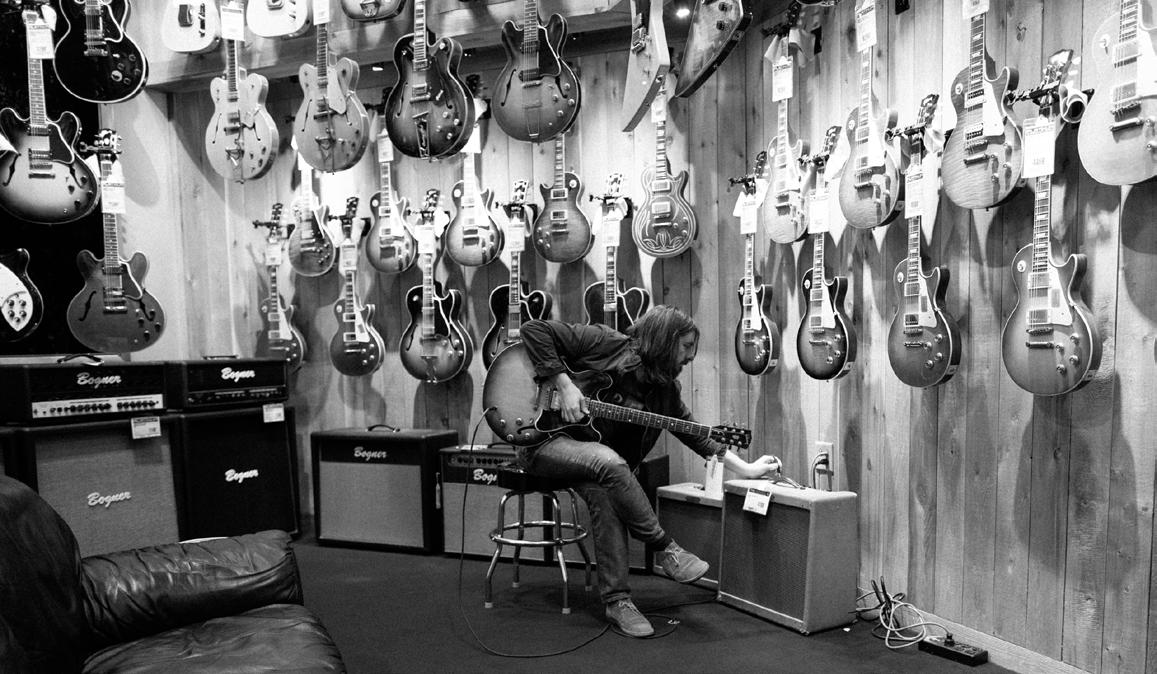
“I was just telling him [Prine] how I always felt kind of like that,” when I was growing up,” he said. “When I was a kid, that’s all we Cobb said. “I found out Sam Phillips does it, so I guess I’m not half ate. We didn’t have any other choices. We just had pork chops and crazy. And then John says, ‘Well, Sam Phillips produced one of my pot roast, and just classic Southern dishes growing up. Green beans, albums.’ Man! Then I talked about Phil Spector on something. He okra, and black-eyed peas — stuff like that growing up…So it’s says, ‘Well, Phil Spector and I wrote a couple songs together.’ The funny. I would say music was like that for me, too, because I grew guy obviously had done everything. There was a point on the phone up in a Pentecostal family — and we did have country music in our where I just shut up. house — we definitely had hymnals. I love that music still to this day.
“Feeling, you know. John was an incredible singer. When John That’s all I heard was hymnals. sang a lyric, you knew he was speaking the truth. That’s hard to do. “But we had country music, and it was whatever was the most I mean, there are a lot of incredible sing- popular country music at the time. Comers and people that can sing the phone book. And they have great voices. But I “I was at a dinner at my house mercial country music. And, as a kid, I thought the Beatles were the coolest band love it when you hear someone so iden- with this band, and they played a of all time, or Led Zeppelin, and the Rolltifiable — you know it’s them immedi- Drive-By Truckers song that Jason ing Stones. That’s the stuff that was my ately. You know it’s John Prine, because Isbell had written. And, I heard that. music. The other was my parent’s music.” you can hear his personality in his voice. “There are a lot of great singers, but not a lot of John Prines.” Nashville, sometimes in spite of itEvery lyric in that song reminded me of how we grow up, and the way we’re taught. Don’t get too big for Cobb’s ears, and a calling for rock & roll, led him first to New York with his band, The Tender Idols, then to the West Coast. He was escaping the weight the self, attracts writers and musicians who your britches, and all that. It made South often carries. He had no idea he know how to translate the emotion of a me really homesick — it was kind of was actually finding home again. song. Hank is responsible. Felice and the beginning of it.” “When I moved to Los Angeles, I Boudleaux are responsible. Kristoffer- wanted to produce rock & roll records,” son. Willie. Guy Clark and Townes. The he said. But, I got out there and I startlist goes on. Cobb understands this dynamic and leans into it. ed missing all those things that I grew up with. All of a sudden,
The story of country music can be equated to those found in many I liked okra. It was my favorite thing in the damn world. All of a Southern novels — bizarre, hard-working magic found in the people sudden, I like butter beans, and I started really missing home and and routines of daily living, touching on guilt, love, sin, and yes, food. missing the Southern way and the gentleness of the South. The Raised on a small island off Savannah, Georgia, Cobb’s first immer- sense of family and a community, it just evaded me for a long sion into music was through his church. time. I started getting homesick.
“Yeah, I think country music particularly, was like Southern food “And I had a daughter when I lived out there. Now she's 11, living
here. I never forget driving in L.A. and thinking she would never know was. And, Shooter is like an encyclopedia of country music. I mean, what it’s like to grow up in the South. Those are the things I want her he obviously grew up around it and knows it well. And when I heard to see. I want her to experience how I grew up, in a way. the edgier stuff, that’s when I got it. It was like an epiphany.”
“I was at a dinner at my house with this band, and they played In retrospect, Cobb had it inside him all along. a Drive-By Truckers song that Jason Isbell had written. And, I heard “When I was a kid and wanted to be loud, and you want to turn that. Every lyric in that song reminded me of how we grow up, and the guitar up and play drums loud,” he said. “Rock & roll definitely the way we’re taught. Don’t get too big for your britches, and all that. resonated with me, but I didn’t know it for a long time, how much I It made me really homesick — it was kind of the beginning of it.” was into country. But, I just didn’t put the links together. I listened to
Cobb produced records with Shooter Jennings in L.A. — Put the The Rolling Stones and Keith Richards stealing from Southern guitar O Back in Country, Electric Rodeo, and The Wolf between 2005 and players quite a bit, and listened to Led Zeppelin and Jimmy Page was 2007 for Universal South. certainly stealing from that ...”
“I produced Shooter Jennings when I was out there, and he was Jennings also connected Cobb with others of a like mind. from Nashville,” he said. “We just hit it off. And it was like two idiots “Through him, I met Jamey Johnson, and wound up doing a couple hanging out ordering, again, back to KFC. Stupid stuff, too — I of records,” he said. “I started coming to Nashville, and every time I mean, we’d go over to his house and have plates full of pigs in a came over, I just really loved the community here. I don’t think there’s a blanket. Just things that reminded us both of home, and that made better music community in the world.” me homesick, too. He picked up his family and moved to “I just didn't realize how much of that I really loved and finding the truth that I “He (Jamey Johnson) found himself Tennessee. It is Nashville’s gain — it is the world of roots music’s gain. He found really love country music that way. He surrounded, of course, by many himself surrounded, of course, by many was responsible for it because Shooter of the greatest songwriters and of the greatest songwriters and musiturned me on to so much. I didn’t grow musicians on the planet, a virtual cians on the planet, a virtual land of endup listening to the rare cuts of Johnny Paycheck, Jerry Reed, or whatever it land of endless opportunity.” less opportunity. “L.A. is so very competitive,” Cobb said. “You have to compete to survive continued on page 20

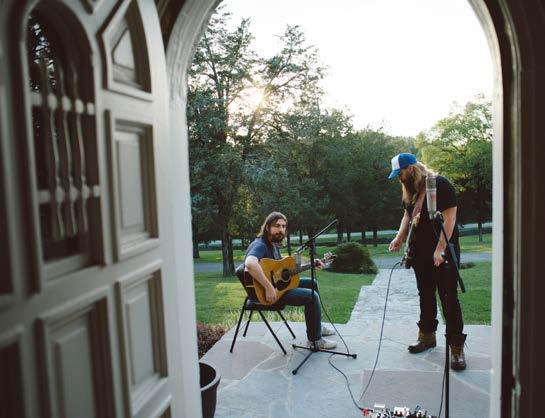



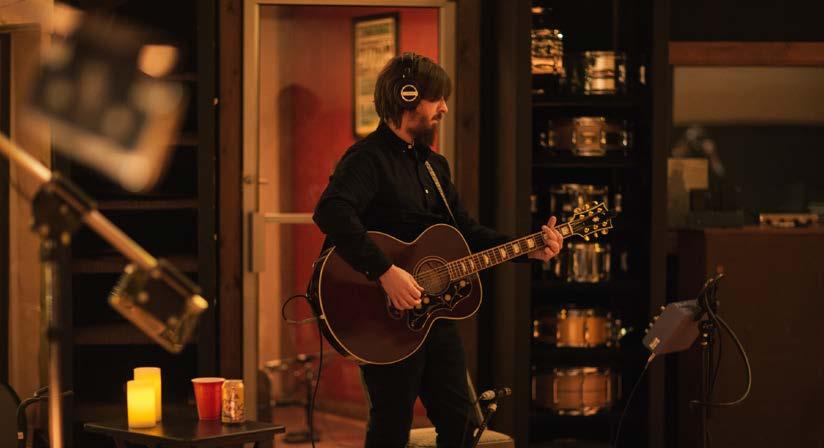

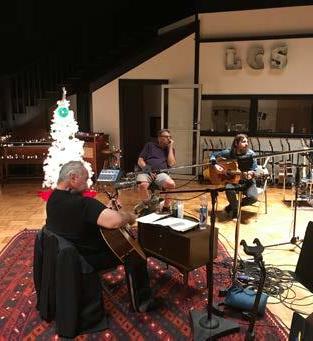
because it’s so expensive. And here, every time I came, anybody was just happy to drop by and do something. They didn’t care. This is the welcoming family community of Nashville. I just adored it.
“People in the industry, the labels, and everyone, were just so incredibly kind. It just made me fall in love with the city. It definitely wasn't the thunderstorms.”
Cobb has never looked back, making music that resonates and presses boundaries. His work with Prine, Isbell, Stapleton, Carlisle, Jennings, Johnson, Sturgill Simpson, Mary Chapin Carpenter, Amanda Shires, Lori McKenna, Brent Cobb, Colter Wall, and so many others, is provocative and simple simultaneously. He shines a light on the sound they all carry within.
“I’m really proud, honestly, of just the musicianship in this region of the world,” he said.
Nashville is a true gathering place, a crossroads in the heart of the country, that still relies on common threads. Rock & roll, country, and blues find purchase here. Music, religion, literature, and race all play a part in the city’s history. Roots run deep here, and beneath the layers of corporate sheen beats a heart waiting to be explored.
“This is the beauty here,” Cobb said. “The beauty in the South, and the beauty in Nashville. The fact that so many cultures came and mixed together, and brought so many great attributes to make American music what it is. I think American music is the heart of popular music for the last one hundred years, maybe more. And it all comes from here in some form or another.”
“I think it goes right back to hymnals and church, for me. My grandmother was a Pentecostal minister. At my grandmama's church, my aunt and uncle were in the band. There was a family friend who played pedal steel, and another friend who played bass. That was the church band. I was at church Monday, Wednesday, Fridays, Sunday night, vacation Bible study, revivals. Just hearing that music.
“I mean, there was always a pedal steel my whole life. I don't remember life without one. It was just part of where I grew up. And it’s interesting how that came full circle later to record making. I never thought twice about it.”
Cobb hasn’t thought twice about making music, period. He didn’t know how he would make it, but he never considered anything else.
“I never set out to be a producer,” he said. “I always wanted to be in a band, signed. And I definitely was in a band that toured and got signed, but that wasn't my destiny. When I started to produce the records, I realized I always loved being in the studio the most. And then, secondly, I get to be in whatever artist’s band that I'm working with a lot of times. I can kind of be in that band for that month. It’s such a fun thing.
“I think things are simple, maybe. I don’t think I’m very complicated. I like the satisfaction of making something feel good. Think about it. I just want you to feel it.”
"I have a couple favorite boards but I’m really impressed with the custom Chandler EMI console I’ve been using this year. Favorite outboard is my Fairchild 670 and EMI TG limiters.

I love lotsa guitars for different things. There’s a 1931 Martin 0018 — a gift from Jason Isbell — that I’ve been tracking a lot with this year." — Dave Cobb











